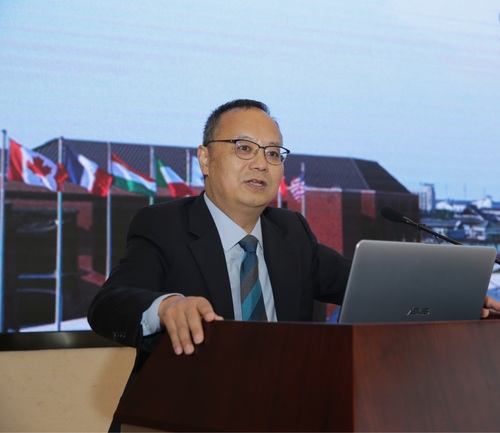 Prof. Yonghua Song to be the next Rector of The University of Macau
Prof. Yonghua Song to be the next Rector of The University of Macau
The recruitment for the next Rector of the University of Macau (UM) began in March 2017. Thereafter, a number of consultation forums were held to collect the views of alumni, staff and students, as well as members of the University Council, on the requirements, expectations, and factors for consideration of the next Rector. Through a global search and rigorous deliberations, the University Council ultimately voted unanimously to recommend to the Chief Executive that Prof. Yonghua Song be the only candidate for the next Rector of the University of Macau. Dr. Chui Sai On, Chief Executive of the Macao SAR has accepted the University Council’s recommendation to appoint Prof. Yonghua Song as the ninth Rector of UM, who will assume office on January 9, 2018.
Prof. Song has held a number of leadership positions at British and Chinese universities and has been actively promoting internationalization and institutional cooperation. As such, he is particularly familiar with the development and operational models of higher education institutions in Europe, the United States and Asia. In addition, Prof. Song has rich experience in higher education management at a senior level. With a broad international perspective and an extensive domestic and global network, he is enthusiastic about the cause of higher education. Therefore, the University Council decided that Prof. Song is the most suitable candidate to lead UM in its next stage of development.
Prof. Song is a world-renowned scholar in electrical engineering. He received his Ph.D. from the China Electric Power Research Institute. Due to his outstanding knowledge in his field and contributions to power system research, he was awarded D.Sc. by Brunel University in 2002 and an Honorary D.Eng. by Bath University in 2014.
From 1991 to 1996, Prof. Song held various teaching and research positions at U.K. universities. In 1997, he was appointed Professor of Power Systems at Brunel University and later as Pro-Vice-Chancellor for Graduate Studies at Brunel University in 2004. The latter appointment made him the first Chinese scholar assuming a senior management position at a British university. In the same year, he was elected a Fellow of the Royal Academy of Engineering. In 2007, he took up a Pro-Vice Chancellorship and Professorship of Electrical Engineering at the University of Liverpool, holding concurrently the position of Executive President at Xi’an Jiaotong – Liverpool University in Suzhou, China.
Prof. Song was invited to return to China as Professor of Electrical Engineering at Tsinghua University in 2009 and was appointed Assistant President in the same year. Currently, he is the Executive Vice President of Zhejiang University, as well as Founding Dean of the International Campus and Professor of Electrical Engineering and Higher Education of the University. His main duties are development planning, internationalization of the University and recruitment of top talents.
Prof. Song has long been engaged in electrical power system research. His research, in areas such as energy, information and control engineering, has enhanced the development of the electric power industry. Due to his outstanding scientific achievements and professional stature, he has been an appointed advisor to the Science and Technology Committee of the Macao SAR Government since 2002.
The University Council is confident that with the joint effort of the management team led by Prof. Yonghua Song and all faculty, students, and alumni, UM will scale new heights in all-rounded development towards the goal of the University in becoming an internationally recognized outstanding institution of higher learning.
The University Council also expressed again its appreciation for Prof. Wei Zhao’s contribution to the University during his rectorship.


